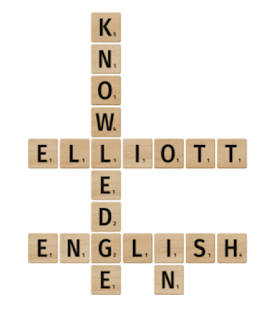Publications
Books
Elliott, V. (2023) Foundations of Educational Research. Bloomsbury.
Elliott, V. (2020) Knowledge in English: Canon, Curriculum and Cultural Literacy. Routledge.
- Winner of the UKLA Academic Book Award 2022.
Ingram, J. & Elliott, V. (2019) Research Methods for Classroom Discourse. Bloomsbury.
Journal Articles
If you would like a pdf of any of these feel free to email me. Where there are weblinks below the article is open access and can be found by clicking on the link.
Elliott, V. & Courtney, M. (2023). Teaching poets of colour at Key Stage 3: categorising what is taught. English in Education, 57:2, 91-101
Elliott, V. & Hodgson, J. (2021). Setting anagenda for English Education research. English in Education, 55:4.
Elliott, V. & Olive, S. (2021). Secondary Shakespeare in the UK: what gets taught and why? English in Education, 55:2, 102-115.
- Elliott, V. (2019). Detecting the Dane: re-creating Shakespearian genre in A level literature. English 68 (262), 283–304.
- Elliott, V. (2018) Thinking about the Coding Process in Qualitative Data Analysis. The Qualitative Report, 23(11), 2850-2861.
- Ingram, J., Elliott, V., Morin, C., Randhawa, A., & Brown, C. (2018). Playing the system: incentives to 'game' and educational ethics in school examination entry policies in England. Oxford Review of Education, 44(5), 545–562.
- Elliott, V. (2017). Gender and the contemporary educational canon in the UK. International Journal of English Studies, 17(2). 45–62.
- Elliott, V. (2017). What does a good one look? Marking A level English scripts in relation to others. English in Education, 51(1), 58–75.
- Elliott, V. & Dingwall, N. (2017). Roles as a route to being 'Other': drama-based interventions with at risk students. Emotional and Behavioural Difficulties, 22(1), 66–78.
- Elliott,
V. (2016). Study what you most affect: beginning English teachers’ preparedness
to teach Shakespeare. CEA Critic,
78(2),
199-212.
- Elliott, V. & Hore, B. (2016). ‘Right nutrition, right values’: the construction of food, youth and morality in the UK government 2010-2014. Cambridge Journal of Education.
- Ingram, J. and Elliott, V. (2016). A critical analysis of the role of wait time in classroom interactions and the effects on student and teacher interactional behaviours. Cambridge Journal of Education, 46(1), 37–53.
- Won journal’s prize for best paper of 2016
- Ikeno, N., Fukazawa, H., Watanabe, J., Elliott, V., Shawyer, C., Olive, S., & Davies, I. (2015). Putting the case for building a bridge between drama and citizenship education. Citizenship Teaching & Learning, 10 (3), 237–250.
- Elliott, V. (2014). MARC: a thought experiment in the morality of automated essay marking. Changing English, 21(4), pp. 393–401.
- Elliott, V. (2014). The treasure house of a nation? Literary heritage, curriculum and devolution in Scotland and England in the 21st century. The Curriculum Journal, 25(2), pp. 282–300.
- Ingram, J. and Elliott, V. (2014). Turn taking and ‘wait time’ in classroom interactions. Journal of Pragmatics 62, pp. 1–12.
- Elliott, V. (2013). Empathetic projections and affect reactions in examiners of ‘A’ level English and History. Assessment in Education: Principles, Policy and Practice 20(3), pp. 266–280.
- Elliott, V., Randhawa, A., Ingram, J., Nelson-Addy, L., Griffin, C. & Baird, J.-A. (2020) Feedback in action: A review of practice in English schools. London: Education Endowment Foundation.
- Baird, J.-A., Caro, D., Elliott, V., El Masri, Y., Ingram, J., Randhawa, A., Isaacs, T., Stobart, G., Meadows, M., Morin, C., Pinot de Moira, A. & Taylor, R. (2018). Examination Reform: Impact of Linear and Modular Examinations at GCSE. London: HMSO.
- Elliott, V., Baird, J.-A., Hopfenbeck, T.N., Ingram, J., Thompson, I., Usher, N., Zantout, M. Coleman, R., & Richardson, J. (2016). A marked improvement? A review of the evidence on written marking. London: Education Endowment Foundation.
- Tawell, A., Thompson, I., Daniels, H., Elliott, V., Dingwall, N. (2015) Being Other: The Effectiveness of Arts Based Approaches in Engaging with Disaffected Young People. Oxford University Department of Education.
.jpg)



Comments
Post a Comment